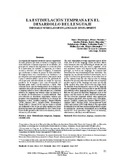Mostrar el registro sencillo del ítem
La estimulación temprana en el desarrollo del lenguaje
| dc.rights.license | http://creativecommons.org/licenses/by-nc-sa/3.0/ve/ | es_VE |
| dc.contributor.author | Riera Montenegro, Mayra Verónica | |
| dc.contributor.author | Grados Fabara, Katya Mercedes | |
| dc.contributor.author | Peñaherrera Molina, Catherine Paola | |
| dc.contributor.author | Molina Lozada, Mayra Alexandra | |
| dc.date.accessioned | 2020-06-26T04:06:28Z | |
| dc.date.available | 2020-06-26T04:06:28Z | |
| dc.date.issued | 2020 | |
| dc.identifier.uri | http://www.saber.ula.ve/handle/123456789/46843 | |
| dc.description.abstract | La estimulación temprana desarrolla aspectos importantes del niño, primero que nada se destaca el lenguaje cuyo valor determina la manera de pensar de los infantes, del principio de estimulación dependerá la evolución justa de la motricidad, los sentidos, la cognición, los valores sociales y afectivos, así como el lenguaje; el elemento que condiciona la forma de pensar de todo individuo. El lenguaje tiene una característica ya histórica y es precisamente que tiene grandes poderes, bien puede sanar o por el contrario dañar a quien la recibe, partiendo de esto la presente refl exión tomará en cuenta los aspectos positivos de la lengua y más específicamente del hablante quien emite y recibe mensajes a diario. Para estimular desde aspectos fundamentales de la lengua y la comunicación es preciso especifi car que no solamente con el lenguaje verbal se lleva a cabo este proceso, se hablará entonces de lenguajes no verbales como las mímicas y los sonidos de la naturaleza y el medio ambiente. Para esta refl exión se abordaron importantes autores que propones ideas importantes alrededor de la estimulación temprana, a saber: Ordóñez Legarda y Tinajero Miketta (2010), Gardner (2001), Serrano (2008), Calsamiglia y Tusón (2001) y Cerezo (1994) con los cuales se acordó que estimular es buscar que los niños emitan reacciones positivas haciendo que el ambiente de clase y todo lo que rodea al niño garantice altos niveles de armonía, efi cacia, efi ciencia y efectividad. | es_VE |
| dc.language.iso | es | es_VE |
| dc.publisher | SaberULA | es_VE |
| dc.rights | info:eu-repo/semantics/openAccess | es_VE |
| dc.subject | Estimulación temprana | es_VE |
| dc.subject | Lenguaje | es_VE |
| dc.subject | Comunicación | es_VE |
| dc.title | La estimulación temprana en el desarrollo del lenguaje | es_VE |
| dc.title.alternative | The early stimulation in language development | es_VE |
| dc.type | info:eu-repo/semantics/article | es_VE |
| dcterms.dateAccepted | Mayo-2019 | |
| dcterms.dateSubmitted | Junio-2019 | |
| dc.description.abstract1 | The early stimulation develops important aspects of the child, fi rst of all the language stands out there whose value determines the way of thinking of infants, the just evolution of motor skills, the senses, cognition, social and emotional values will depend on the stimulation principle, as well as the language; the element that determines the way of thinking of every individual. The language has an already historical characteristic and it is precisely that it has great powers, it can either heal or on the contrary harm the one who receives it, starting from this the present refl ection will take into account the positive aspects of the language and more specifi cally of the speaker who issues and receive messages daily. To stimulate from fundamental aspects of the language and the communication it is necessary to specify that not only with the verbal language this process is carried out, then we will speak of nonverbal languages such as the mimics and the sounds of nature and the environment. For this refl ection important authors were approached who propose important ideas around early stimulation, namely: Ordóñez Legarda and Tinajero Miketta (2010), Gardner (2001), Serrano (2008), Calsamiglia and Tusón (2001) and Cerezo (1994) with which it was agreed that to stimulate is to seek that children emit positive reactions by making the classroom environment and everything around the child guarantee high levels of harmony, eff ectiveness, effi ciency and eff ectiveness. | es_VE |
| dc.description.colacion | 91-99 | es_VE |
| dc.description.email | revistacifranueva@gmail.com | es_VE |
| dc.description.email | mayra.riera2308@utc.edu.ec | es_VE |
| dc.description.email | katya.grados8512@utc.edu.ec | es_VE |
| dc.description.frecuencia | Semestral | |
| dc.description.paginaweb | http://www.saber.ula.ve/cifranueva/ | |
| dc.identifier.edepositolegal | ppi 201202ME4019 | |
| dc.identifier.eissn | 2244-8438 | |
| dc.publisher.pais | Venezuela | es_VE |
| dc.subject.institucion | Universidad de Los Andes | es_VE |
| dc.subject.keywords | Early stimulation | es_VE |
| dc.subject.keywords | Language | es_VE |
| dc.subject.keywords | Communication | es_VE |
| dc.subject.seccion | Cifra Nueva: Artículos | es_VE |
| dc.subject.tipo | Artículos | es_VE |
| dc.type.media | Texto | es_VE |
Ficheros en el ítem
Este ítem aparece en la(s) siguiente(s) colección(ones)
-
Cifra Nueva - Nº 041
Enero - Junio 2020


